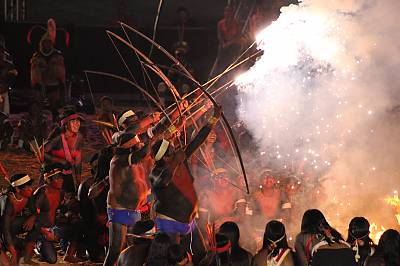- Brazil

World Indigenous Games and Interethnic Dialogue

1. ICH domains
Social practices, festive events, knowledge and practices concerning nature and the universe
2. Short description
Traditional sports and games provide an instrument for peaceful coexistence and the establishment of healthy relations amongst community members and different Indigenous peoples. This is the case, for example, of many track competitions that run from one Indigenous village to another, supporting integration and reciprocity, contributing to interethnic dialogue and promoting peace. Games are often closely linked with traditional rituals and celebrations, as well as reflect indigenous world views, legends and histories. In this sense, traditional games can be considered as ICH manifestations.
The World Indigenous Games is an event that seeks to value traditional games practiced by Indigenous and native peoples as a form of safeguarding their cultural heritage. Moreover, the games seek to bring together different peoples as a way of celebrating their customs, traditions and values. Finally, the games aim at raising awareness amongst the non-indigenous population regarding the vast diversity of indigenous cultures. Traditional indigenous games are thus not only ICH manifestations but represent important elements in promoting dialogue between different peoples, creating spaces for the sharing of experiences and cultural values.
One indigenous game hosted in the games is Xikunahati, a traditional sport also called hiara or head football played in Brazil. A traditional variant of soccer, it is played on all fours, using the head as the principal offensive weapon for blasting the ball and keeping it off the ground at all times. Played with a ball made of mangabeira sap, the game takes place to celebrate special moments or ceremonies such as the first harvest, initiation rites of young people, as well as in settling disputes between villages.
Further information:
Additional information about the World Indigenous Games:
http://www.unesco.org/new/en/brasilia/about-this-office/single-view/news/world_indigenous_games_brazil_2015_celebrating_is_what_ma/https://www.youtube.com/watch?v=gv_PkewTdoc
How traditional sports and games builds intercultural dialogue and peace:
http://www.unesco.org/new/en/social-and-human-sciences/themes/physical-education-and-sport/traditional-sports-and-games/
3. Link with sustainable development
By bringing together different peoples as a way of celebrating their customs, traditions and values and raising awareness amongst the non-indigenous population regarding the vast diversity of indigenous cultures, the World Indigenous Games promotes understanding and dialogue between different peoples, contributing to SDG 16, dedicated to the promotion of peaceful and inclusive societies for sustainable development.
4. Questions for reflection
The World Indigenous Games relies on the support of numerous institutional partnerships, such as federal and local governments, international entities and private companies. The realisation of such a large celebration requires great effort and can only be achieved if indigenous peoples are able to gather the necessary institutional and financial support without which such an event becomes impracticable. What are some useful considerations to keep in mind or necessary measures to keep in place to balance the integrity of the games but yet be financially sustainable?